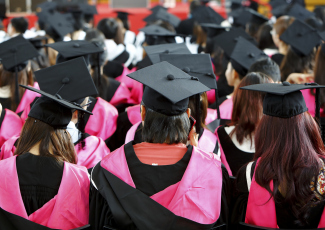How to Help Latino Students Thrive
By Rebecca L. Weber
May 23, 2016
The president of El Paso Community College shares how he’s moved the needle on degree completion for Latino students.
El Paso Community College (EPCC) in Texas currently holds the top spot when it comes to producing Latino associate degree holders, according to the Hispanic Outlook in Higher Education Magazine. Over five campuses, EPCC serves more than 35,000 students, 85 percent of whom are Latino.
“You’ve got to have high expectations for the student that you serve,” says William Serrata, president of EPCC and an active member of Excelencia’s Presidents for Latino Student Success. “And from my perspective, in particular for Latino students, I’ve yet to see a student rise to low expectations. If we continue to raise the bar, students will continue to meet our expectations and in many cases exceed them.”
Serrata shares what EPCC has learned about helping to close the achievement gap for Latino students.
Dual enrollment establishes college readiness.
For the past 27 years, EPCC has been part of the El Paso Area College Readiness Consortium with the University of Texas at El Paso (UTEP). During the first decade, the participating institutions emphasized college readiness; now they are focused on enhancing and expanding dual-credit opportunities for high school students.
Some 6,500 students in El Paso participate in the dual-credit programs, with testing sites at all the partner high schools. One school district tests all eighth-graders.
“If they’re college-ready, then we’re going to try to get them into college courses as soon as possible,” Serrata says. “If they’re not college-ready, it gives the district an opportunity to remediate them and ensure that students have an opportunity to take advantage of dual credit.”
A focus on FAFSA, graduation and reverse transfer helps students complete.
Eighty-five percent of EPCC students receive financial aid, and about 25 percent live below the poverty line.
“In the Latino population, they are incredibly debt-averse,” Serrata says about his students. “One of the things that we want to make sure is that as many of them as possible take advantage of the programs that are available to them, such as Pell.”
EPCC partners with the Chamber of Commerce and UTEP to hold Free Application for Federal Student Aid (FAFSA) nights, where students can get one-on-one assistance with filling out the forms. This has improved FAFSA completion rates.
EPCC administration also tracks students and then notifies them when they are nearing degree completion. Traditionally, colleges have made their students apply for graduation — which assumes that students know when they’re about to graduate. “With many first-time-in-college students and first-generation college students, that’s not necessarily the case,” Serrata says.
And EPCC works with UTEP on reverse transfer. EPCC students who have taken anywhere from 15 to 58 credit hours and transfer to UTEP before they receive an associate degree may later become eligible for the degree. Once a former EPCC student reaches 60 credit hours at UTEP, EPCC receives that student’s transcript.
“We evaluate the transcript, and if a student is eligible to graduate, we graduate them,” Serrata says. Nearly 5,000 students have received associate degrees at EPCC through reverse transfer.
Recruit students earlier than high school.
Serrata is a firm believer in the notion that college begins in kindergarten. “Enrollment-management literature indicates that students as young as second and third grade are deciding if they’re going to college — and we at higher ed wait to recruit them until they’re high school students,” he says.
Currently, Serrata is working on EPCC’s master plan through 2025. “My freshman class of 2025, they’re in third grade right now,” he says. Serrata visits these young students at their own schools and organizes trips to the college campuses.
“We get them in the classroom with faculty. We do science experiments with them, so they get hands-on experience of what it’s like to be in college.”






